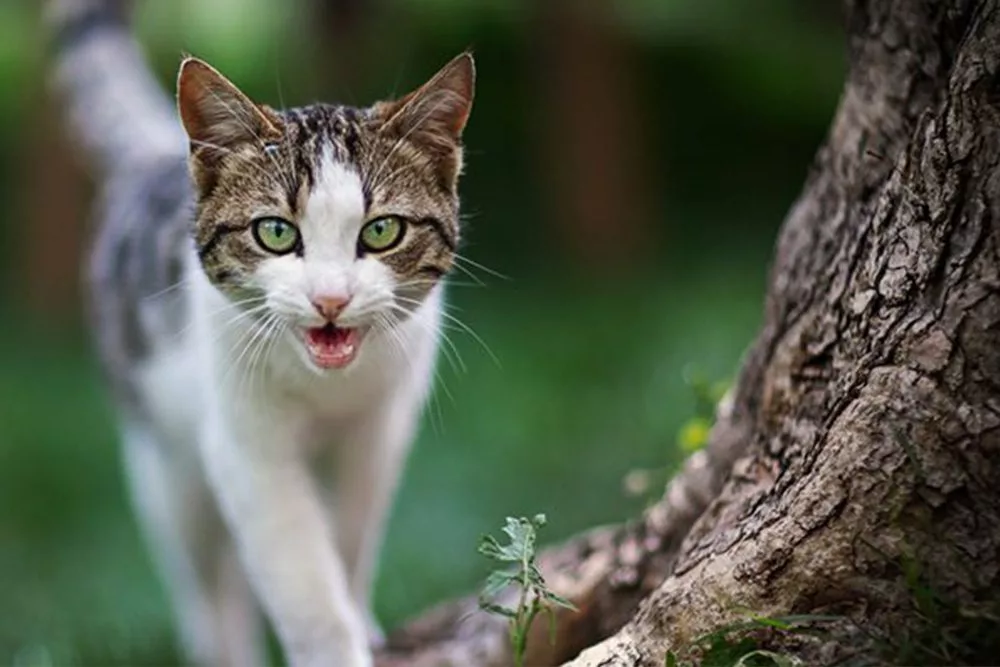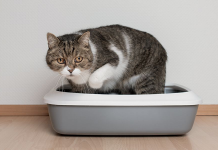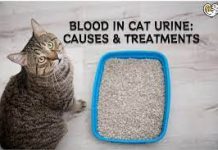Understanding Excessive Cat Meowing: Causes, Solutions, and Tips
If you’ve found yourself wondering, “Why is my cat meowing so much?” you’re not alone. Cats have a unique way of communicating, and excessive meowing can signal various needs. In this comprehensive guide, we’ll delve into the reasons behind your feline friend’s increased vocalization and provide insights into managing this behavior. By understanding your cat’s communication, you can ensure their well-being and strengthen your bond.

Natural Cat Behavior and Communication:
Cats are natural communicators, and meowing is one of their primary ways of expressing themselves. Each meow can carry different meanings, from greetings and requests for attention to announcements of discomfort or hunger. While some meowing is normal, excessive vocalization might indicate underlying issues that need attention. By learning to decipher your cat’s vocal cues, you can better understand their emotions and respond appropriately.
Possible Reasons for Excessive Meowing:
Physical Discomfort:
Cats may meow more when experiencing pain or discomfort. Dental problems, arthritis, and other health issues can lead to increased vocalization. Keep an eye out for any changes in their behavior or routines that might indicate physical issues.
Hunger or Thirst:
One of the simplest explanations for excessive meowing is hunger or thirst. Cats might vocally remind you when it’s mealtime or when their water bowl needs refilling. Ensuring they have access to fresh food and water can help curb this behavior.
Attention Seeking:
Cats crave human interaction, and meowing can be their way of asking for attention. If your cat meows persistently when you’re occupied or ignoring them, they might be trying to engage you. Providing playtime and affection can help fulfill their need for companionship.
Stress or Anxiety:
Changes in the environment, such as moving to a new home or introducing new pets, can trigger stress in cats. Excessive meowing might be their response to unfamiliar or unsettling situations. Creating a calm and consistent environment can alleviate their anxiety.
Aging and Cognitive Changes:
As cats age, cognitive changes can lead to altered behavior, including increased vocalization. Senior cats might meow more due to confusion, disorientation, or age-related health conditions. Extra care and patience are crucial for these senior companions.
Medical Concerns and Symptoms:
When Excessive Meowing Indicates Health Issues
Excessive meowing can sometimes be a sign of underlying medical problems. It’s essential to pay attention to accompanying symptoms that could point to health concerns:
Changes in Litter Box Habits:
If your cat is meowing excessively and also avoiding the litter box, it might indicate urinary tract issues or infections. Straining to urinate or blood in the urine are red flags.
Weight Loss:
Unintended weight loss combined with increased meowing might signal hyperthyroidism or other metabolic disorders. Monitor your cat’s weight and consult a vet if you notice a significant drop.
Lethargy and Decreased Appetite:
If your cat’s meowing is accompanied by lethargy and a loss of appetite, it could indicate a more serious health problem. These signs warrant prompt medical attention.
Vomiting or Diarrhea:
Digestive issues can lead to discomfort and excessive meowing. Keep an eye on your cat’s gastrointestinal health and report any unusual symptoms to your vet.
It’s crucial to remember that each cat is unique, and behaviors can vary. If you’re concerned about your cat’s excessive meowing or notice any of these symptoms, consulting a veterinarian is recommended.
Behavioral Causes and Solutions:
Addressing Environmental Triggers
Understanding your cat’s environment and addressing behavioral triggers can help reduce excessive meowing:
Environmental Changes:
Cats are creatures of habit, and alterations to their environment can cause stress and more vocalization. Introducing changes gradually and providing safe spaces can ease their anxiety.
Enriching Activities:
Engaging your cat with interactive toys and play sessions can alleviate boredom and keep them mentally stimulated, reducing the need for attention-seeking meows.
Regular Playtime:
Allocate dedicated playtime to bond with your cat. Physical and mental stimulation can reduce pent-up energy and excessive vocalization.
Routine and Consistency:
Cats thrive on routine. Maintaining consistent feeding times, play sessions, and sleep schedules can create a sense of security that reduces stress-related meowing.
Tips for Responding to Excessive Meowing:
Strategies for Effective Communication
When faced with your cat’s persistent meowing, consider these strategies for a harmonious response:
Stay Calm:
Responding with a calm demeanor can prevent reinforcing the behavior. Avoid scolding or shouting at your cat, as it may exacerbate stress.
Observe Patterns:
Keep track of when and where your cat meows excessively. Identifying patterns can help you understand the triggers and address them.
Provide Positive Reinforcement:
Reward your cat when they exhibit desired behavior. Offering treats or affection when they’re quiet can help reinforce quiet moments.
Use Interactive Toys:
Interactive toys that dispense treats or engage your cat’s senses can redirect their attention and reduce meowing.
Consult a Professional:
If your efforts to manage excessive meowing aren’t effective, consider seeking advice from a veterinarian or animal behaviorist.
When to Seek Professional Help:
Navigating Excessive Meowing with Expert Guidance
While some meowing is normal, persistent excessive vocalization might require professional evaluation:
Consult a Veterinarian:
If your cat’s meowing is accompanied by concerning symptoms, consult a veterinarian to rule out underlying health issues.
Behaviorist Assistance:
If behavioral triggers persist, consider consulting an animal behaviorist for personalized guidance.
Patience and Understanding:
Understanding that each cat is unique and may require individualized solutions is key to managing excessive meowing.
Frequently Asked Questions (FAQs) About Excessive Cat Meowing
1. Why is my cat meowing so much all of a sudden?
Excessive meowing can result from changes in their environment, health issues, or a need for attention. Observe for any recent changes or signs of discomfort.
2. How can I tell if my cat’s meowing is a health concern?
Pay attention to accompanying symptoms such as changes in litter box habits, weight loss, lethargy, or vomiting. Consult a vet if these signs persist.
3. Can stress cause my cat to meow more?
Yes, stressors like moving, introducing new pets, or disruptions in routine can lead to increased vocalization. Creating a calming environment can help.
4. Is it normal for senior cats to meow more?
Yes, senior cats might experience cognitive changes that lead to more meowing. Keep an eye on their behavior and consult a vet for guidance.
5. How can I address my cat’s excessive meowing due to hunger?
Ensure your cat’s feeding routine is consistent, and provide fresh water and balanced meals. Consider interactive toys to alleviate boredom.
6. Will playing with my cat reduce excessive meowing?
Engaging your cat in regular playtime can help them expend energy and reduce meowing due to boredom or attention-seeking.
7. Can I train my cat to meow less?
While you can’t eliminate meowing entirely, you can redirect behavior through positive reinforcement and addressing underlying triggers.
8. Should I ignore my cat’s excessive meowing?
While ignoring attention-seeking meows can discourage the behavior, ensure your cat’s needs are met and consult a vet if the meowing persists.
9. When should I consult a veterinarian about my cat’s meowing?
If your cat’s meowing is accompanied by concerning symptoms or is a sudden change, it’s best to consult a vet to rule out health issues.
10. Is excessive meowing always a sign of a problem?
Not necessarily. While excessive meowing can indicate issues, some cats are naturally more vocal. Consider your cat’s behavior patterns and overall health.
Conclusion
Deciphering the reasons behind your cat’s excessive meowing involves considering both natural communication and potential health or behavioral issues. By observing their behavior, seeking veterinary advice when necessary, and creating an enriched environment, you can foster a strong bond with your feline companion while addressing their needs effectively.




